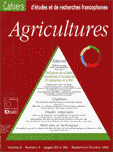Impact environnemental de trois cultures énergétiques et bilan d'énergie
Résumé
Three energy crops were compared from the environmental point of view. The crops, possibly suitable for Belgium, included oilseed rape for biodiesel, sugar-beet for bioethanol, and short rotation coppice (SRC) for wood production. Studying the environmental impact of an energy production process is highly complex; we therefore concentrated on two main aspects: cultivation and global CO2 emission. SRC is less intensive in terms of fertilisation and use of pesticides. This could increase biodiversity and decrease nitrogen leaching. However, the quantifies applied are not the only criterion to be used since different crops have different requirements. CO2 emissions were calculated from the energy balance, comparing all energy outputs to all energy inputs associated with CO2 exchange. All energy inputs in the entire chain leading up to the final product (source of energy) were taken into account. SRC, due to its better productivity and energy balance, again appeared very attractive. Nevertheless, since wood has less uses than alcohol or biodiesel and is less easy to utilise, the other energy crops should not be excluded.Téléchargements
Publié
1995-09-01
Comment citer
Jossart, J.-M., Vanhemelryck, J.-L., & Ledent, J.-F. (1995). Impact environnemental de trois cultures énergétiques et bilan d’énergie. Cahiers Agricultures, 4(5), 377–382 (1). Consulté à l’adresse https://revues.cirad.fr/index.php/cahiers-agricultures/article/view/29912
Numéro
Rubrique
Articles

